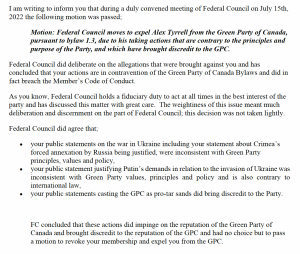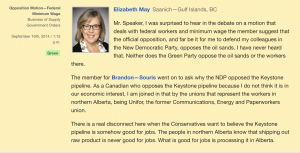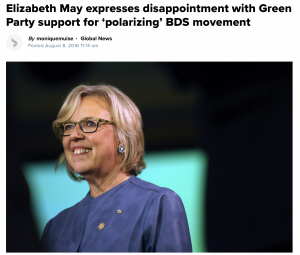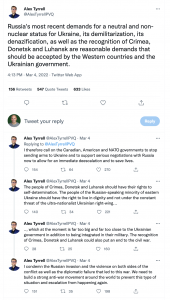The Federal Council (FC) of the Green Party of Canada (GPC) has taken the Draconian, unprecedented step of expelling from its membership the sitting leader of a provincial Green Party.
The newly expelled member is Alex Tyrrell, leader of the Green Party of Quebec (PVQ).
For the reasons that follow, I oppose this decision, unequivocally.
Full Disclosure
Before explaining my objections to FC’s decision, it behooves me to make full disclosure.
First, like me, Tyrrell is an avowed eco-socialist. As far as I am aware, he is the only leader of any Canadian Green Party who self-identifies as an eco-socialist.
In accordance with his avowed commitment to eco-socialism, Alex has consistently taken policy positions that are reflective of eco-socialist values.
This does not mean that I agree with everything that Alex says or does, but it does mean that, on matters of public policy, Alex and I overwhelmingly agree.
Second, I first met Tyrrell in 2016. At that time, I was embroiled in a conflict with then-GPC leader Elizabeth May.
Over May’s objections, participants in the GPC’s 2016 policy convention in Ottawa adopted, by a wide margin, a policy I had authored and submitted. That policy called upon the GPC to support the use of boycotts, divestments and sanctions (BDS) to bring an end to Israel’s brutal occupation of Palestinian territories. Immediately after the members’ adoption of the BDS policy over May’s strenuous objections, May threatened to resign as GPC leader.
Two provincial Green Party leaders publicly aligned themselves with Ms. May: Ontario Green Party leader Mike Schreiner and Andrew Weaver. Weaver was then the B.C. Greens leader, but he has since quit the B.C. Greens and now invents reasons to ridicule his former party. Both Schreiner and Weaver issued statements criticizing the GPC’s newly-adopted BDS policy.
Only one provincial leader, Alex Tyrrell, publicly defended it. The rest, to my knowledge, remained silent.
Third, in the 2020 leadership contest, the GPC leadership contest committee refused to approve my application to enter the leadership contest. I appealed that decision and was eventually approved as a leadership candidate, finishing a close second behind Annamie Paul. After my leadership application was rejected but before I filed my appeal, only one provincial Green Party leader publicly called for my candidacy to be approved. That leader was Alex Tyrrell.
Finally, in 2019, I accepted an invitation from Tyrrell to serve on the PVQ’s Executive Committee and Shadow Cabinet. I withdrew from those positions in early 2020, at the outset of the GPC leadership contest, because I believed it would be inappropriate for me to serve in those positions while I was running to be GPC leader.
Notwithstanding these facts, I have endeavored to be as objective as possible in forming an opinion about Tyrrell’s expulsion from the GPC.
Some fundamental principles applicable to expulsion from party membership
The GPC has long claimed to ‘do politics differently’. This means, among other things, that Greens adhere to higher standards of governance, transparency and procedural justice than other political parties.
The harshest possible sanction that a political party can impose upon a member is expulsion. An expelled member loses the right to advocate and vote in policy, governance and constitutional matters. Moreover, expulsion invariably stigmatizes the expelled member and compromises that individual’s ability to be received as a credible voice in the political discourse.
Accordingly, expulsion must be a sanction of last resort. It should be applied only in the most extreme circumstances and only following the use of a procedure which scrupulously adheres to basic principles of due process.
The need for the GPC’s Federal Council to be scrupulously fair and restrained is heightened when the sanction of expulsion is being applied to a provincial party leader, especially a provincial leader who is on the cusp of a provincial election.
The expulsion of a provincial party leader raises legitimate concerns about GPC interference in provincial party affairs.
There is also a risk that, by expelling Tyrrell from the GPC membership, the GPC’s Federal Council will compromise the ability of the PVQ to contest the forthcoming election, scheduled to occur on or before October 3, 2022. Assuming that the GPC had legitimate reasons for expelling Alex, the timing of its Federal Council could not have been worse, because the next Quebec election is less than three months away, and there is no way that the PVQ could elect a new leader and enable that leader to prepare adequately for an imminent election.
By contrast, there is no federal election on the horizon. So why did FC do this now?
As I discuss below, the decision to expel Tyrrell was based in part on criticisms he made in 2019 of statements by Elizabeth May with respect to the tar sands. Why are his 2019 comments being raised three years later, in the lead-up to Quebec’s provincial election? How could it possibly be in the interests of the provincial party to revive this controversy now?
Did Federal Councillors who voted for Tyrrell’s expulsion consider that the PVQ’s ability to access provincial subsidies depends critically on the number of votes it obtains in the forthcoming election and that, by expelling its leader only weeks before the next provincial election, FC has unwittingly handed to the PVQ’s political opponents a powerful weapon with which to bludgeon the provincial party?
Federal Council’s reasons for expelling Alex are woefully inadequate
On July 12, 2022, FC’s President, Lorraine Rekmans, sent a letter to Tyrrell advising him that FC intended to hold a meeting on the evening of Friday, July 15 (a mere three days later) in which to decide whether to expel him.
The President’s letter cited five reasons for its decision to proceed with a possible expulsion:

On July 16, 2022, less than 24 hours after the meeting on July 15, FC’s President sent a letter to Tyrrell advising him of its decision to expel him from the GPC:

The President’s July 16 letter cited only three of the five concerns cited in the President’s letter of July 12. This implies that the FC ultimately concluded that two of the five complaints cited in the President’s July 12 letter did not support Tyrrell’s expulsion from the GPC.
The first of those two complaints was Tyrrell’s alleged participation “as a GPC member in an interview with the known alt-right personality André Pitre.”
That interview, which is entitled “Ecology – The Program of the Green Party of Quebec with Alex Tyrrell”, was conducted and published by Lux Media. Contrary to the claim made in the President’s July 12 letter to Tyrrell, André Pitre did not participate in the Tyrrell interview. When Tyrrell pointed this out during the FC meeting of July 16, Federal Councillor Jean-Charles Pelland, the Quebec representative on FC, apologized profusely for having misinformed FC about the nature of the interview.
During the July 15 meeting with FC, Tyrrell also pointed out that, in the Lux Media interview, he had spoken in defence of Indigenous rights, women’s reproductive rights and trans rights. Tyrrell also advised FC that he does not filter his interview requests and that, in any event, he does not regard interviews on right-wing platforms as a bad thing, because the best way to convert right-wing voters to a left-wing agenda is to converse with them (an argument with which I agree wholeheartedly).
The other complaint omitted from the President’s July 16 letter to Tyrrell was the claim that Tyrrell was “publicly calling elements of the current leadership race ‘almost sabotage’”. Tyrrell made the comment in a July 7 interview with the Toronto Star. The Star asked various GPC figures, including Tyrrell, to comment on a new GPC requirement that the next leader be subjected to a continual performance review crafted and conducted by FC. Tyrrell’s full comment to the Star, which is omitted from the GPC President’s July 12 letter to Tyrrell, was as follows:
These never-ending and sometimes toxic internal power struggles are bad for the party. It seems that regardless of who the members choose, there will be a continuous power struggle with the party establishment and federal council following their election. It’s almost sabotage to set the party up for continuous power struggles this way.
Notably, two other GPC figures also criticized the continual performance review in that same Toronto Star article. Former interim GPC leader Jo-Ann Roberts told the Star that “they are complicating the role of the leader, rather than simplifying it.” Najib Jutt, a political strategist in Alberta who worked with former GPC leader Annamie Paul during the 2021 federal campaign, and who intends to apply as a leadership candidate in the GPC leadership race this year, went further than Roberts in his comments to the Star. According to the Star:
Like Roberts, [Jutt] voiced concerns about the vagueness of the performance review provision in the leader’s job description. He predicted that it will create conflict between the party’s governing body — called the federal council — and the next leader, whoever that is.
To my knowledge, no one has suggested that either Roberts or Jutt should be expelled from the GPC because they criticized the requirement of continual performance reviews.
At the end of the day, the FC chose to justify it decision on the basis of three complaints about Tyrrell’s public statements. Two of those complaints related to Tyrrell’s comments on the Ukraine war and one of them related to Tyrrell’s comments on Elizabeth May’s policies with respect to the tar sands.
Is the GPC ‘pro-tar sands’?
The President’s July 16 letter alleges that Tyrrell’s comments ‘cast the GPC as pro-tar sands.’
Despite having performed various internet searches, I have been unable to find any explicit statement by Tyrrell prior to July 16 that the GPC is ‘pro-tar sands.’ What I did find were statements to the effect that the GPC’s policies under Elizabeth May were ‘too soft’ on the tar sands.
According to a July 2019 article in the Toronto Star:
OTTAWA—The federal Green Party’s openness to continued activity in Alberta’s oilsands has created a rift with some supporters — including party leaders in two provinces — who want to rapidly shut down the industry that employs tens of thousands of people and is responsible for a large portion of Canada’s greenhouse gas emissions.
Alex Tyrrell, leader of the Green Party of Quebec, is spearheading the dissent and calling on the federal Greens to change their environmental platform ahead of the national election on Oct. 21. In an interview Wednesday, Tyrrell accused federal Green Leader Elizabeth May of being too soft on the oilsands because her party’s platform would allow the industry to continue operating for decades to come.
Tyrrell said he agrees with “90 per cent” of the proposals in the plan, but that he’s troubled by this aspect of the Green platform that he argued is out of sync with the more ardent side of the environmental movement and will discourage some voters from supporting the federal party.
Two weeks ago, he launched a website calling on May to change the platform and support the “rapid shut down” of the oilsands within the first mandate of a Green government, while investing heavily to support the estimated 140,000 people who work in the industry. The site includes a list of Green members supporting his call, including Saskatchewan Green Leader Shawn Setyo and several current and former Green election candidates.
What might have caused Tyrrell to accuse Elizabeth May’s GPC of being ‘too soft’ on the tar sands? Let us the count the ways.
In 2014, Elizabeth May stated in a Parliamentary debate that the Green Party ‘does not oppose the oil sands’:

I agree with May that the GPC can and should support Canadians who currently earn a living from the tar sands, but it is entirely possible for the GPC to support those workers and to oppose the tar sands at the same time. We can do so by advocating for a government-funded jobs guarantee for workers who lose employment in the tar sands industry as a result of a rapid transition to renewable energy, and by advocating for massive government investment in renewables, which create more jobs per dollar of investment than fossil fuels.
The tar sands is an industry that must be shut down as rapidly as possible if we are to have any real hope of preserving the liveability of this world. It is for that reason that most Greens, I believe, would readily describe themselves as ‘opponents of the tar sands.’
May’s dubious statements about the tar sands do not end there.
In an April 2018 op-ed in the Narwhal, May argued for “federal support” for the construction of upgraders and oil refineries in Alberta. To be fair to May, she also argued in that op-ed that, in exchange for federal support for the construction of fossil fuels infrastructure in Alberta, Alberta should be required to commit to reduce greenhouse gas emissions from the tar sands to 35 megatonnes by 2050.
For the sake of argument, let’s assume that federal support for the construction of upgraders and refineries in Alberta would be, in theory, a fair trade for Alberta’s commitment to reduce GHG emissions from the tar sands to 35 megatonnes by 2050. Even on that assumption, May’s proposal was fatally flawed because there is no reason to believe that an Alberta government would respect that commitment. Once the fossil fuels infrastructure has been funded and constructed, it would undoubtedly be used for decades to come to perpetuate Canada’s dependence on fossil fuels, but the Alberta government’s emission reduction commitments would be worth no more than the paper they are written upon. History has taught us that governments in Canada routinely flout their emission reduction commitments.
Subsequently, in May 2019, May unveiled the GPC’s new “Mission: Possible – the Green Climate Action Plan”. According to a GPC press release, the plan called on Canada to “end all imports of foreign oil. Use only Canadian fossil fuels and invest in upgraders to turn Canadian solid bitumen into gas, diesel and other products providing jobs in Alberta.”
Implementation of May’s plan would have necessarily entailed increased reliance within Canada on oil from the tar sands – a particularly destructive form of oil extraction.
Tyrrell was by no means the only figure within the Canadian environmental movement to criticize this aspect of the GPC’s new climate plan. In a Facebook post, Patrick Bonin, a Climate and Energy Campaigner at Greenpeace Canada, asked whether the GPC had ‘fallen on its head’ and was now promoting the rail transportation of ‘dirty oil’ from the tar sands to Quebec:

Despite Elizabeth May’s dubious comments on the tar sands and fossil fuels infrastructure, I do not believe that May is ‘pro-tar sands’. On the contrary, I have every confidence that Elizabeth May would like to see the tar sands phased out as rapidly as humanly possible.
Based, however, on my experience of Elizabeth May, I also believe she has a regrettable tendency to play both sides of the political fence.
Green Party members saw this tendency with May’s adoption of the slogan ‘Not Left. Not right. Forward.’

Greens also saw this unfortunate tendency when May expressed sympathy for the plight of Palestinians while condemning the only peaceful tactic available to them to secure their rights, namely, BDS:

If you have a leader who tries to be all things to all people, you should not be surprised when people become confused about what your party represents.
The worst that can be said about Tyrrell’s comments on the GPC’s tar sands policies is that those comments resulted from confusion generated by Elizabeth May’s mixed messaging on the tar sands. That is nowhere close to a justification for expelling Tyrrell from the GPC.
The Ultimate Sin: Condemning NATO’s Proxy War Against Russia
Two of the three reasons cited in the President’s July 16 letter relate to the Ukraine war.
The controversy arising from Tyrrell’s comments on the Ukraine war began with a series of tweets that Tyrrell issued on March 4, about one week after Russia launched its invasion of Ukraine:

No objective, rational person would regard these tweets as an effort to justify Russia’s invasion. After all, Tyrrell concluded his Twitter thread by stating “I condemn the Russian invasion and the violence on both sides of the conflict as well as the diplomatic failure that led to this war.”
Some critics of Tyrrell have nonetheless argued that, because Tyrrell described certain of Russia’s demands as “reasonable”, he sought, in effect, to justify Russia’s invasion. That argument ignores a key distinction between demands and tactics: whether a party to a dispute has reasonable demands is a separate question from whether the tactics that party employs to achieve those demands are acceptable.
Imagine that the owner of a residential property discovers that her neighbour is storing extremely hazardous materials on the adjacent property. Upon learning of this, she complains to her neighbour, vigorously and repeatedly, about the risks posed by those substances. Rather than address those concerns by removing those substances from the adjacent property, the neighbour brings even more hazardous substances onto the adjacent property. The complainant becomes furious, purchases a handgun, and then shoots her neighbour dead. She has undoubtedly addressed her entirely legitimate complaint, but she has done so by means of a criminal and utterly deplorable tactic.
As I have explained previously, the historical record amply supports the legitimacy of certain of Russia’s complaints – particularly its claim that Western powers violated their commitment not to expand NATO eastward – but the legitimacy of those complaints does not mean that Russia’s invasion was justified.
Implicitly, the GPC itself recognized the legitimacy of at least two of Russia’s complaints in a statement the GPC issued on January 31, 2022.
With respect to Russia’s complaint that the annexation of Crimea was preceded by a coup, the GPC stated “The US played a key role during the Revolution of Dignity or Maiden revolution in 2014, effectively supporting the removal of the democratically elected president Viktor Yanukovych” [my emphasis].
With respect to Russia’s many complaints about NATO expansion, the GPC stated:
The Green Party is calling for a different approach to ensuring peace and security for all European states. The German unification negotiations between the US and the Soviet Union produced a promise that NATO forces and missiles would not be stationed in eastern Germany and that NATO would not expand “one inch further”. While that pledge was specific to Germany, the spirit and intent was that NATO would not expand eastward.
When the Warsaw Pact was disbanded, NATO should have followed suit, making way for a new model for peace and security in Europe that excludes the two superpowers. Instead, NATO now includes 10 former Warsaw Pact countries and four former Yugoslav republics, effectively encircling Russia on its western border.
This expansion, coupled with NATO interventions in the Middle East, have strengthened President Vladimir Putin’s contention that Russia needs to take strong counter measures to protect its security and sovereignty.
Parenthetically, the GPC’s position on NATO expansion has become incoherent since its January 31 statement: although the GPC correctly recognized in that statement that NATO powers promised the USSR that NATO would not expand eastward and that the breaking of that promise contributed to the Ukraine war, Green MPs Elizabeth May and Mike Morrice recently supported yet another expansion of NATO. NATO now plans to incorporate Sweden and Finland, the latter of which shares a 1,300 km-long border with Russia and fought a war with Russia as recently as 1940.
The President’s July 16 letter takes particular issue with Tyrrell’s position on Russia’s “forced annexation” of Crimea.
The conflict over Crimea, however, is far more complex than the President’s letter acknowledges.
Crimea has a population of about 2.4 million. Nearly two-thirds of its population is ethnically Russian. Only 15% is ethnically Ukrainian.
Crimea became a dependency of the Ottoman empire in the 15th century. Russia annexed Crimea in 1783 after a war with Turkey. When the Bolsheviks secured Crimea, it became an autonomous republic within Russia. The USSR transferred Crimea to Ukraine in 1954.
After Ukrainian independence in 1991, Ukraine’s central government and Crimea clashed, culminating in Ukraine forcibly bringing Crimea under its control.
Russia ‘seized’ Crimea in 2014, following a U.S.-orchestrated coup in Ukraine. The coup regime was unambiguously hostile to Russia and Russia’s culture and language. A referendum was hastily organized in Crimea following the coup. The referendum asked local populations whether they wanted to rejoin Russia as a federal subject, or if they wanted to restore the 1992 Crimean constitution and Crimea’s status as a part of Ukraine. The official result from the Autonomous Republic of Crimea was a 97 percent vote for integration of the region into the Russian Federation with an 83 percent voter turnout.
For various reasons, it may well be that Russia’s annexation of Crimea was illegal, but given the historical record, reasonable people should be able to agree that the origin and nature of the dispute over Crimea is not black and white. Moreover, whatever the legalities of the annexation may be, Crimea is now heavily defended by Russian forces. No serious military observer believes that Ukraine can retake Crimea by force. Even if it could, would Ukraine’s rule over Crimea bring long-term stability to the region, given the ethnic composition of the Crimean population?
John Quigley was CSCE expert on Crimea from 1994-95. He is a specialist in international law and Professor Emeritus at Ohio State University. Following Russia’s invasion, he wrote an op-ed about Crimea for the U.S.-based Responsible Statecraft. He argued that:
For Ukraine, political reality comes into play. Ukraine is unlikely to get Crimea back, no matter how Russia’s war plays out. Ukrainians do not have the attachment that Russians have towards Crimea. A Crimea under Russia may be better for long-term stability.
Tyrrell’s Expulsion Violates Basic Principles of Due Process
Quite apart from the inadequacy of FC’s stated reasons for expelling Tyrrell, the process by which he was expelled made a mockery of due process.
First, although the President’s July 12 letter provided a brief summary of the accusations against Tyrrell, at no point prior to or at the meeting of July 15 did FC provide to Tyrrell the evidence in support of those allegations. For example, the July 12 letter accused Tyrrell of having made various statements, but FC did not actually produce copies of the impugned statements to Tyrrell.
It is fundamental to procedural fairness that, before being called upon to defend himself, an accused member should receive full disclosure of both the accusations against him and the evidence supporting those accusations. Moreover, that information should be provided to the accused member well in advance of his meeting with FC so that the accused member will have adequate time to prepare his defence.
Second, in the meeting of July 15, members of FC repeatedly referred to a letter they had received from the Quebec Wing of the GPC. That letter purportedly calls for Tyrrell’s expulsion from the GPC. Various comments made by FC members during the July 15 meeting made clear that the Quebec Wing’s letter weighed heavily on their minds, yet Tyrrell was never shown a copy of that letter. During the meeting of July 15, Tyrrell made clear to FC that he had never seen the Quebec Wing’s letter, yet FC did not provide a copy of the Quebec Wing’s letter to Tyrrell or provide to him a reasonable opportunity to respond to that letter before FC rendered its decision to expel Tyrrell.
Third, during the meeting of July 15, Tyrrell accused Pelland, the Quebec representative of FC, of having attempted to subvert Tyrrell’s leadership of the PVQ by convening and participating in an illegitimate meeting whose purpose was to replace Tyrrell as PVQ leader. (Pelland denied having participated in any such meeting.) Tyrrell told FC that he learned of this illegitimate meeting in a letter from Elections Quebec. At that point in the FC meeting, another member of FC requested that Tyrrell provide a copy of the Elections Quebec letter to the President. Tyrrell agreed to do so. However, FC rendered its decision to expel Tyrrell before Tyrrell had an opportunity to provide the Elections Quebec letter to the President.
I myself have not seen the Elections Quebec letter to which Tyrrell referred during the meeting of July 15, but based on Tyrrell’s description of that letter, it is at least possible that the Elections Quebec letter raises serious questions as to whether Pelland should have recused himself from deliberations regarding Tyrrell’s expulsion. Accordingly, FC should not have rendered a decision to expel Tyrrell without first providing to Tyrrell a reasonable opportunity to provide the Elections Quebec letter to the President.
In fairness to FC, it must be said that the FC has lacked adequate due process protections for many years. These due process deficiencies are not new – successive councils and general meetings of the members have failed repeatedly to rectify these deficiencies. If, however, the GPC is to live up to its promise to ‘do politics differently’ and to prioritize participatory democracy, it must address these due process deficiencies as effectively and expeditiously as possible.
What is this controversy all about?
Members of the GPC and the PVQ have every right to criticize Alex Tyrrell. No leader should be immune to criticism. That is as true of Alex Tyrrell as it is of Elizabeth May, Mike Schreiner and Andrew Weaver.
If party members deem it appropriate to do so, they even have the right to call publicly for a leader’s resignation.
Expulsion, however, is a different matter. Expelling an individual from the membership deprives that individual of the right to participate in debates and votes relating to party policies and procedures. Expulsion therefore has major implications for a member’s rights to free speech and freedom of conscience.
It is no answer to say that, because Federal Councillors are elected by the members, their decision to expel a member enjoys democratic legitimacy. GPC Federal Councillors are typically elected by only a very small percentage of the members. In the May 2022 FC elections, for example, fewer than 10% of eligible voting members participated.
Ultimately, expulsion is a penalty that ought to be applied in the rarest of cases and only with scrupulous regard for the principles of due process.
That penalty certainly should not be applied in cases where there are legitimate differences of opinion over climate policy, war and peace or any other matter of public interest.
In the final analysis, the reasons given by FC for expelling Tyrrell amount to no more than legitimate differences of opinion. Accordingly, the right thing to do is to restore Tyrrell’s membership, and to do so forthwith.



Well said.!
I’m not the least bit surprised at the actions taken by the Green Party. They have been devolving for some time and I seriously don’t see any hope for the future.
An articulate, honest,and principled analysis, Dimitri. You and Alex reflect the leadership most of us thought we would get in the Greens. I am beyond disappointed in Elizabeth May and the immature and illegitimate executive branch. Another Orwellian coup and betrayal of the base that got them there
Thank you Dimitri… my hope is that your presentation can be shared widely and used as a catalyst for discussion among Greens and those who may be interested in learning about the Greens. (Sadly we cannot rely on mainstream media to disseminate facts about controversy in a meaningful and non-ideological way.)
I appreciate and agree wholeheartedly with your positions especially vis a vis the conflict in Ukraine. It appears to me that you are driven by an absolute vision of right vs. wrong, without any monetary or other impediments. You are, IMO, Canada’s leader. Hopefully you will align yourself with a political party that deserves you as its leader, or create a new party. I am a member of the Democratic Socialist Party of Canada (DSCP). What about it? In any case, you are the best position I have come across. What ever you do I am with you.
Dimitri Lascaris I agree with you 100% and will be your advocate as much as I can.
Well, I certainly AM surprised. The “tendency to play both sides of the political fence” was, I feel, not exclusively Elizabeth May’s. It has been a general tendency of many Green policymakers and supportive commentators. For me, what is “regrettable” is not this fence-sitting tendency, but rather Tyrell’s expulsion, which seems so very contrary to it.
Well said Dimitri. Thank you for filling in the gaps and for putting on your lawyer hat to lay this ‘case’ out in a logical and chronological way. I appreciate reading the historical references to statements too. I hope Alex’s membership is reinstated along with an apology.
Thanks Dimitri for your analysis. Wish you would reconsider and run again to lead the Green Party. Right now the Party is moving not FORWARD but DOWNWARD.
Excellent breakdown of the unfortunate decisions being made, and why exactly they are in need of legitimate criticism. Especially as they lack necessary evidence and protocols that respect the scope and depth of democracy Greens expect of their party.
Too few heads making decisions without the framework and critical thinking that needs to be done to reach decisions of great importance to the many.
Thank you, Dimitri, for this well thought out and articulated report. You really should have been the GPC Leader, and would have, if not for the failings of the governing structure and it’s chief occupant, most anyone around and paying attention during that Leadership contest would agree. The GPC would be leaps ahead rather than floundering in mediocrity, I am certain of that.
dimitri, you are easily the best spoken politician i have heard in twenty years. russia is a colonial bully. that russia was once a socialist model does not change this fact nor excuse their genocidal excursion. it befuddles me as to why you insist on walking in to every ‘third rail’ issue that exists on the planet. if you modified your stance(s) on 2% of your policy issues you could dominate left politics in canada for the foreseeable future.
Thank you for writing this, and sending it out into the world. I appreciate it. I was on the local riding association executive for the last federal election but I have left that role. I still vote Green in the hopes that they will eventually find their way and offer a true, courageous alternative. When I mention the word “socialism” to my green friends they say that they can’t use the word because it’s the best way to be dismissed by the electorate. Is there another word that means the same thing that might be more palatable?
Maybe time for an “Eco-Socialist Party” to move us forward not downward.
I’m done with the Federal Green Party.
Great work Dimitri as always. Thank you for standing up for Alex, he is the only Green it seems with integrity and courage to speak the truth. Further, he is the only peace politician and candidate in the country as every party other than the Communist and Marxist Leninists are the only ones opposed to war. War fever sweeps the country, and many follow like sheep instead of researching and thinking for themselves. I completely see why you would not run for such a weak party governed by mediocrity.
I am one of the +90% of Greens that never vote on Federal Council elections. Why would I? The candidates are people I know nothing about and they don’t set GPC policy, nor do they run for government. They are more administrators than policy leaders; they don’t represent the values or direction of our party. So the fact that this particularly “woke” FC has gone so far as to expel an active elected leader is another fatal nail in the GPC’s coffin, imo. I will not renew my GPC membership under the woke, neo-liberal, and authoritarian culture that has flourished in the GPC since the self-destructive “leadership” of Annamie Paul. And I agree with other respondents that there is little or no hope for change.
Thank you for your clear explanations Dimitri. I agree wholeheartedly that Alex has been dismissed in a most UNdemocratic way. Elizabeth May is so toxic to the Gpc and should have been booted during your leadership bid.
Thank you, Dimitri. I used to be a Green Party member but let my membership intentionally lapse after watching the machinations of May in the last leadership run. I have no respect for her and am quite angry that she has ruined the one party dedicated to the environment with her ego. I followed you with the hope that you would come back into the fray for this next leadership election and when you instead chose another path, I thought Alex would be a suitable contender. Enough so that I thought I would rejoin the party to support him. Now he has been removed and the whole thing just reeks of the same subterfuge, manipulation and suppression that underpinned the Annamie Paul ascension. The Green Party is finished for me.